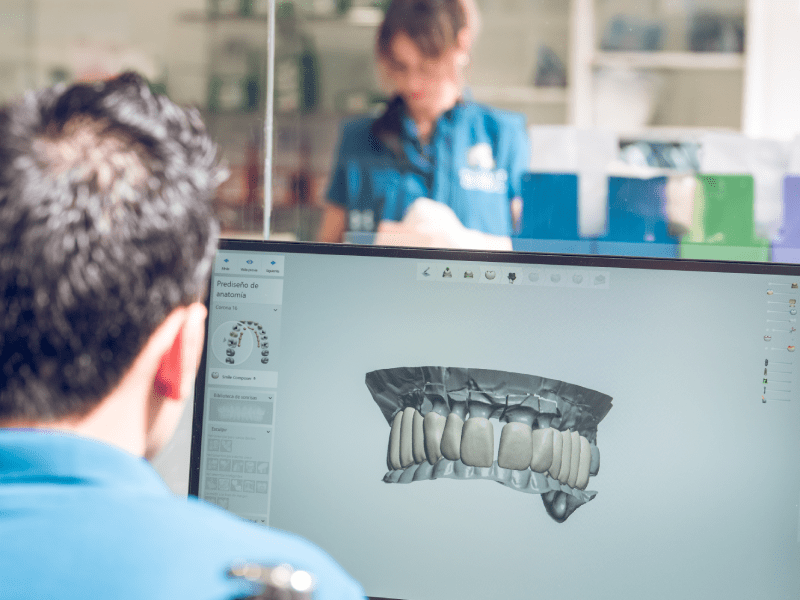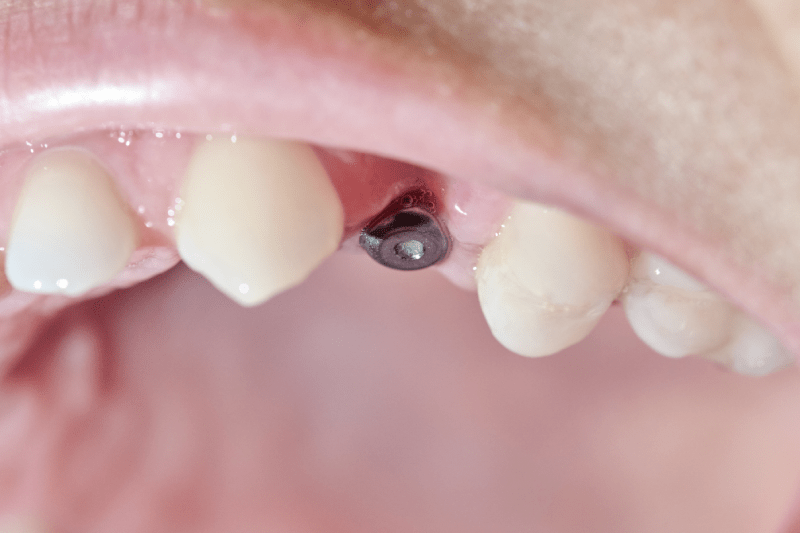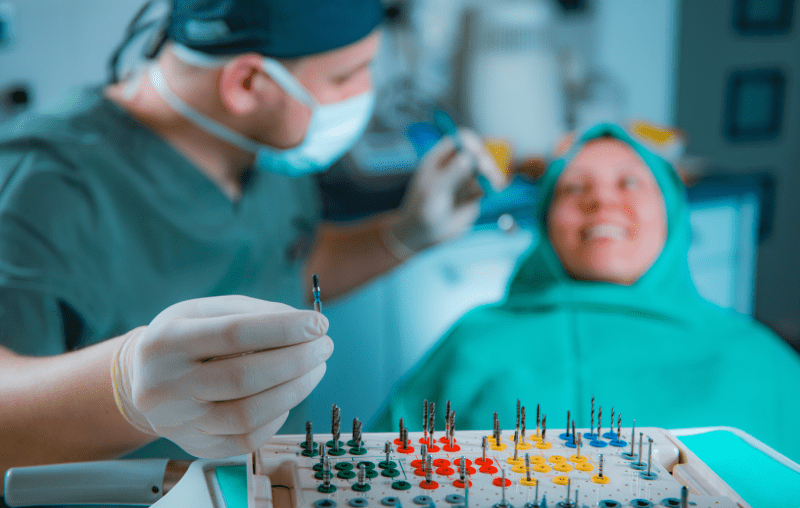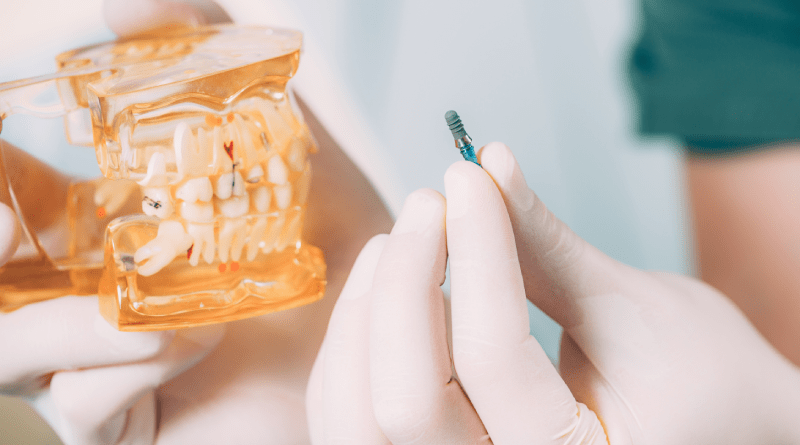How Long Do Dental Implants Last? Where Should I Buy Dental Implants?
What is Dental Implant?
A dental implant is a prosthetic item that is surgically placed in the jawbone to replace a missing tooth or teeth. It is made up of three main parts: the implant itself, the abutment, and the dental crown.
The implant is typically made of titanium and is surgically placed in the jawbone, where it fuses with the bone over time through a process called osseointegration. This creates a strong and stable foundation for the replacement tooth.
The abutment is a small connector that is screwed into the top of the implant. It serves as a platform for attaching the dental crown, which is the visible portion of the replacement tooth. The dental crown is usually made of porcelain or ceramic and is custom-made to match the color, shape, and size of the surrounding teeth.
Dental implants offer several advantages over other tooth replacement options, such as dentures and bridges. Unlike dentures, which can slip or move around in the mouth, implants are securely anchored in the jawbone, making them feel more like natural teeth.
Implants also help to preserve the integrity of the jawbone, as they stimulate bone growth and prevent bone loss that can occur when a tooth is missing. This helps to maintain the facial structure and prevent premature aging.
The process of getting a dental implant typically involves several steps, including a consultation with a dental professional, a dental implant surgery, and follow-up visits to ensure the implant is properly integrated and the replacement tooth is functioning properly.
Overall, dental implants offer a long-lasting and durable solution for missing teeth, improving both the function and appearance of the smile.

How Are Dental Implants Made?
Dental implants are a popular option for replacing missing teeth, and they’re made up of several components that work together to create a strong and stable foundation for a prosthetic tooth or teeth. Here’s a closer look at how dental implants are made:
- Consultation and Treatment Planning: The first step is to visit a dental professional for a consultation, where they will examine your mouth, take X-rays, and discuss treatment options with you. Based on the findings, they will develop a treatment plan tailored to your needs.
- Implant Placement: The actual implant placement procedure is typically performed under local anesthesia. The dentist will create a small incision in the gum tissue and then drill a small hole into the jawbone where the implant will be placed.
- Osseointegration: After the implant has been placed, the jawbone will begin to fuse with the implant over time through a process called osseointegration. This process can take several months, during which time a temporary restoration may be used to maintain the appearance and function of the area.
- Abutment Placement: Once osseointegration has occurred and the implant has fully integrated with the jawbone, the abutment is placed on top of the implant. This connector is typically made of titanium or another durable material and allows for attachment of the prosthetic tooth or teeth.
- Dental Crown Placement: The final step is to attach the prosthetic tooth or teeth, which are typically made of porcelain or ceramic and custom-made to match the color, shape, and size of the surrounding teeth. The crown is then attached to the abutment using dental adhesive or a screw.
Throughout the process, the dental professional will carefully monitor the progress and make adjustments as necessary to ensure the implant is fully integrated and the prosthetic tooth or teeth are securely in place. After the procedure, proper oral hygiene and regular checkups with the dentist are important to ensure the longevity and success of the implant.

How Long Does Dental Implant Treatment Take?
Dental implant treatment can be a great solution for people who have lost one or more teeth, but one question many people have is how long the treatment process takes. There are several steps involved in dental implant treatment, and the overall timeline depends on several factors, including the patient’s health, the location and number of missing teeth, and the complexity of the procedure.
Implant Placement is the placement of a dental implant into the jawbone during a surgical procedure, typically performed under local anaesthetic. This procedure can take 30 minutes to 1 hour per fixture.
After the implant is placed, the jawbone needs time to heal and fuse with the implant in a process called osseointegration. This process typically takes 3-6 months.
Once osseointegration has taken place, the patient returns to the dentist to have an abutment placed over the implant, which will allow a prosthetic tooth or crown to be fitted. The final step is the fitting of the prosthetic tooth or teeth, which are custom-made to blend in with the surrounding teeth. The crown is then attached to the abutment using dental adhesive or a screw and the treatment is completed.
In general, the timeline for dental implant treatment can vary depending on each patient’s individual situation, but the average treatment time is typically 4-6 months when a single implant is required. In cases where multiple implants are required or additional procedures such as bone grafting are necessary, the treatment timeline may be longer. It is important to follow the dentist’s recommendations for post-treatment care and maintenance to ensure the long-term success of the implant.

Is Dental Implant Permanent?
The answer is that while dental implants are designed to be a permanent solution, their longevity depends on several factors.
First, it’s important to understand that the dental implant itself is made of titanium and is surgically placed into the jawbone to create a strong and stable foundation for a prosthetic tooth or teeth. Over time, the implant fuses with the bone in a process called osseointegration, which creates a stable base for the prosthetic tooth.
While the dental implant itself is designed to be a permanent fixture, it’s important to note that the prosthetic tooth or crown may need to be replaced or repaired over time due to normal wear and tear. However, with proper care and maintenance, the dental implant can last for many years, if not a lifetime.
Factors that can affect the longevity of a dental implant include:
- Oral hygiene: Proper brushing and flossing, as well as regular dental check-ups and cleanings, can help prevent gum disease and other oral health problems that can potentially impact the implant’s long-term success.
- Health: Certain health conditions, such as diabetes or autoimmune diseases, may increase the risk of complications or implant failure.
- Habits: Smoking or using tobacco products can increase the risk of implant failure by reducing blood flow to the gums and bone tissue.
- Jawbone density: Sufficient jawbone density is necessary for successful osseointegration of the implant. In cases where there is insufficient bone density or volume, a bone grafting procedure may be necessary to create a stable base for the implant.
It’s important to note that dental implant success rates are very high, with up to a 95% success rate reported. With proper care and maintenance, dental implants can be a long-lasting, reliable solution for missing teeth. You can contact us for reliable and durable dental implant treatments. Our specialist dentists can offer you the most suitable treatments and dental treatments that you can use for a long time.
Why Do Dental Implants Fail?
Dental implants are a popular and effective solution for replacing missing teeth, but like any dental procedure, they may occasionally fail. Here are some of the most common reasons why dental implants fail:
- Poor oral hygiene: Just like natural teeth, implants require proper oral hygiene to remain healthy and functional. If the patient does not practice good oral hygiene, bacteria can build up around the implant and cause an infection, which can lead to implant failure.
- Gum disease: Gum disease, or periodontitis, is a common condition that can cause inflammation and infection in the gums. If left untreated, it can lead to bone loss in the jaw, which can weaken the implant’s foundation and cause it to fail.
- Insufficient bone density: Dental implants are placed into the jawbone, and if the patient has insufficient bone density, the implant may not be able to fuse properly with the bone. This can cause the implant to loosen, shift, or fail altogether.
- Smoking: Smoking or using tobacco products can interfere with the natural healing process, which can delay osseointegration and weaken the implant’s foundation.
- Trauma: Dental implants can occasionally fail due to trauma or excessive force, such as a blow to the face or biting down on a hard object.
- Improper implant placement: If the implant is not placed correctly or the abutment is not properly attached, it may compromise the implant’s stability and lead to failure.
- Systemic diseases: Certain systemic diseases or medical conditions, such as diabetes or autoimmune disorders, can increase the risk of implant failure.
Overall, while dental implant failure is relatively rare, it’s important for patients to understand the factors that can contribute to implant failure and take steps to prevent it. Regular dental check-ups, good oral hygiene, and following the dentist’s aftercare instructions can help maximize the chances of a successful outcome. If an implant does fail, the dentist can often recommend options for repair or replacement.

Where to Buy Dental Implants? Dental Implants in Turkey
Dental implant surgery is a popular and effective way to replace missing teeth, and it’s important to choose a reputable source for purchasing dental implants. One option for individuals seeking high-quality and affordable dental implants is to consider purchasing them in Turkey.
Turkey has become a popular destination for medical tourism, including dental procedures such as implant surgery. There are several reasons why individuals choose to travel to Turkey for dental implants:
- High-Quality Care: Turkey has a thriving dental tourism industry, with many highly trained and experienced dental professionals offering top-quality care at modern and well-equipped facilities.
- Affordable Prices: Dental implant surgery in Turkey can be significantly less expensive than in many other countries, including the United States and the United Kingdom. This can make the procedure more accessible to individuals who may not be able to afford it otherwise.
- Easy Access: Turkey is easily accessible from Europe, Asia, and the Middle East, making it a convenient destination for individuals seeking dental implant surgery.
When purchasing dental implants in Turkey, it’s important to choose a reputable provider who uses high-quality materials and adheres to all safety standards and regulations. Patients should do their research and choose a provider who has a good reputation, positive reviews, and is transparent about their pricing and procedures.
It’s also important to note that while dental implant surgery in Turkey can be more affordable than in many other countries, there may be additional costs associated with travel, lodging, and other expenses. What makes Turkey a good choice for dental treatments is that all this is possible at very affordable prices. People from all over the world may find the cost of dental treatments in Turkey cheap, as the cost of living in the country is low and the exchange rates are high.
Another reason why people prefer Turkey for dental treatments is dental holidays. Dental holidays are when people combine dental treatments with vacation times for added convenience. Turkey has many beautiful cities, natural and historical attractions, pristine beaches and delicious food. Therefore, it is not unusual for people who come to Turkey for dental treatment to stay in the country for a while to spend time. If you want to have dental treatments with a dental holiday, you can take advantage of our package services that include accommodation + transfer.
